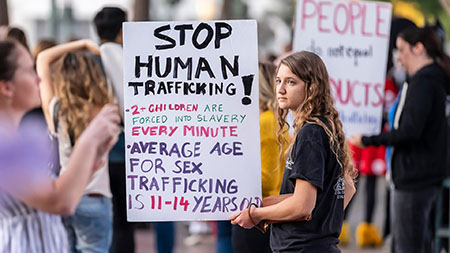by WorldTribune Staff, December 12, 2021
In a recent report, the nonprofit Shared Hope International graded the states on their response to child and youth sex trafficking. Receiving a failing grade were 39 states and Washington, D.C.
 According to the report, Alaska is the lowest-ranked state. Other states receiving an “F” were: Alabama, Arkansas, Arizona, Connecticut, Delaware, Georgia, Hawaii, Idaho, Illinois, Indiana, Iowa, Kansas, Maine, Maryland, Massachusetts, Michigan, Missouri, Montana, Nebraska, Nevada, New Hampshire, New Jersey, New Mexico, New York, North Carolina, North Dakota, Ohio, Oklahoma, Oregon, Pennsylvania, Rhode Island, South Carolina, South Dakota, Vermont, Virginia, West Virginia, Wisconsin, and Wyoming.
According to the report, Alaska is the lowest-ranked state. Other states receiving an “F” were: Alabama, Arkansas, Arizona, Connecticut, Delaware, Georgia, Hawaii, Idaho, Illinois, Indiana, Iowa, Kansas, Maine, Maryland, Massachusetts, Michigan, Missouri, Montana, Nebraska, Nevada, New Hampshire, New Jersey, New Mexico, New York, North Carolina, North Dakota, Ohio, Oklahoma, Oregon, Pennsylvania, Rhode Island, South Carolina, South Dakota, Vermont, Virginia, West Virginia, Wisconsin, and Wyoming.
Florida is the top-ranked state, according to the report, with an overall grade of C and a score of 72.5 out of a possible 110 points.
The 10 states with the highest scores are Florida, Texas, Mississippi, California, Washington, Colorado, Kentucky, Utah, Tennessee, and Louisiana. Besides Florida, the rest of the top 10 states were given a grade of D, with state no. 11, Minnesota, being the only other one with a D grade.
States are scored on six different policy issues and given “extra credit” for extending certain protective policies to youth aged 18 to 24 and child labor trafficking victims.
The six issues are:
1. Criminal provisions: “Clear criminal laws, including those that criminalize buyers of sex with children, are needed to ensure all sex trafficking offenders can be held accountable.”
2. Identification of and response to victims: “States’ laws must identify all commercially sexually exploited children as victims of trafficking and provide for a protective, rather than punitive, response.”
3. Continuum of care: “To break the cycle of exploitation, state laws must provide victims access to funded, trauma-informed services.”
4. Access to justice for trafficking survivors: “A range of civil and criminal justice remedies must be available for victims under the law.”
5. Tools for a victim-centered criminal justice response: “Criminal justice procedures for the benefit and protection of victims must be provided under the law.”
6. Prevention and training: “To help prevent trafficking and promote more just responses to child sex trafficking victims, training for child welfare, juvenile justice agencies, law enforcement, prosecutors, and school personnel as well as prevention education for students, must be required by law.”
INFORMATION WORLD WAR: . . . . How We Win . . . . Executive Intelligence Brief
